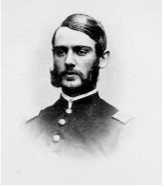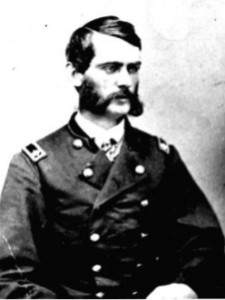I am not a fan of Joshua Chamberlain.
During the Battle of Gettysburg, the 20th Maine was the end of the Union line, the “far left” if you will, and stationed on Little Round Top (not that you care, but Little Round Top wasn’t actually called Little Round Top during the war. A different blog post entirely). Long story short, during the Second Day’s fighting, the 20th Maine runs out of ammunition and Joshua Chamberlain stages a bayonet charge down the hill, effectively stopping the Confederate Army and holding Little Round Top. And on a side note, those Confederates charging up the hill? Alabamaians. They had marched and countermarched all day and were exhausted by the time they got to Little Round Top. Who wants to charge into the face of bayonets and screaming Federal soldiers? Not me. Although, fun fact, only like, 3% of deaths during the war were attributed to bayonet wounds. Don’t quote me, but I read something to that effect in Fredericksburg years upon years ago.
Anyway.
Joshua Chamberlain is a hero. Joshua Chamberlain gets wounded at Petersburg and is promoted to brigadier general because everyone thinks he’s about to die….and then he doesn’t. Joshua Chamberlain is awarded the Medal of Honor because of his actions on Little Round Top.
And then there’s Tom.
Thomas Chamberlain was born on April 29, 1841, which makes him about twenty years old when the war started. He was the youngest in the Chamberlain family and was evidentally a sickly child, with what is described as heart and lung ailments, and is his mothers favorite. Read this as overprotected. For whatever reason (and history doesn’t spell out why), out of the four Chamberlain boys, Tom is the only one who did not attend college. He becomes a store clerk and, ostensibly, runs the store himself.
When the war breaks out, Tom wants to enlist. His mother says no. Fast forward to 1862: Tom and Joshua are in the 20th Maine. They’re “in the rear with the gear” at Antietam. They fight on Mayre’s Heights at Fredericksburg (and snarky comment on Gods and Generals: how can you portray the Battle of Fredericksburg and NOT show the Angel of Marye’s Heights? Big. Thumbs. Down.)
And then there’s Gettysburg. This is when things start to change, in a way, for Tom. Joshua is the Hero of Little Round Top. I mean, look, go to Gettysburg. There’s a monument to the 20th Maine. There’s a sign for the 20th Maine monument pointing to the 20th Maine monument. There’s a wayside (a wayside is the big sign with pictures and information about whatever historical thing you’re looking at. Wayside. Learn it. Embrace it) on the path to the monument showing Joshua Chamberlain leading the bayonet charge down Little Round Top. But there’s no Tom.
Years ago I read an article in the Gettysburg Experience–which I kept and tried to find so I could directly quote it, but it’s who knows where it’s at these days–that Tom was pretty bitter about the
whole incident at Little Round Top. I can see why, too. He and all the 20th Mainers participated in the charge, yet the Medal goes to Joshua. He’s the other Chamberlain–Oh, you’re Joshua’s brother! How does it feel to have such a famous and heroic brother?” It sucked, I’m sure. A further slap in the face? When Joshua is wounded at Petersburg, it was considered a mortal wound: a ball through one hip, nicks the bladder and urethra, and out the other hip. Besides the fact that he’d be a bloody mess, you’re looking at something that was the downfall of soldier after soldier: infection. When Tom gets to Joshua’s side, he insists the surgeons operate and at least try to save him. Sure, the surgeons say. Why not? And in what I’m sure stunned everyone standing there, especially the person who gave Joshua that little field promotion, he survives.
History doesn’t tell us much about what happened to Tom after the war. We know every movement Joshua makes, but Tom kind of fades into the back. What we do know is that Tom continues to suffer from lung and heart problems. He marries his brother John’s widow, Delia, but he’s a crappy husband. They’re unhappy because Tom “was not John, and Delia was a constant reminder of the brother Tom had lost.” He’s an alcoholic. He can’t keep a job. He’s just generally sick and unhappy and ends up dying in 1896 at the all too young age of 55.
Personally, I think Tom would have been the more fun Chamberlain to hang around with. Every portrayal of Joshua is pretty bookish (not that there’s anything wrong with that, I mean, I married a bookish guy). Tom was described as mischievous and likeable; a little rogue.
But Tom was unhappy, too. Did he hate his brother? Maybe. Was he bitter about what happened at Gettysburg, the fact that he fought alongside his brother for four years, attains the rank of Lieutenant Colonel, and yet is pretty much forgotten, not only by his contemporaries, but also by history? Probably. For crying out loud, just look at his Wikipedia page. It’s like, four paragraphs long and mostly talks about Joshua. I can see why he drank.
In a letter to–who else–Joshua, then governor of Maine, Delia wrote about Tom, “He seems to feel that he was born unlucky.” It breaks my heart. Tom was tenacious. He was brave, he was a scrappy 120 pounds and constantly sick, yet fought just as hard as anyone–the magical Joshua Chamberlain included–at Little Round Top. I think an online article from The Gettysburg Experience: “Joshua and Thomas Chamberlain, Brothers in Arms” by Diana Loski sums it up beautifully, but hauntingly:
Like so many soldiers scarred by the war, Tom Chamberlain survived its horrors only to drown in its aftermath.
The majority of the above is from the dark recesses of my brain, but all quotes are taken from The Gettysburg Experience archives, at http://www.thegettysburgexperience.net/past_issue_headlines/2010/september2010/chamberlain.html


I spent the day at the National Civil War Museum in Harrisburg, PA. On the “Walk of Valor” (Maine section) I readily found Joshua Chamberlain’s commemorative brick, but no Tom. I just wanted you to know that I rectified the situation … and “Tom’s Brick” was placed in the walk three weeks ago. The inscription reads, “Tom Chamberlain – Sgt. to Lt. Col – 20th Maine.” I’d like to think he sees it as one small candle in the universe of time.
Great blog, I must say! You have a delightful, funny, and powerful way of expressing yourself. Keep writing. We need people like you in the world!
Kera
Thank you so much! Your kindness means a lot to me! It made me teary eyed to read of your kindness for Tom. So many men–and women–are nameless to history. Their valor deserves to be remembered! Tom holds such a special place in my heart. I’m so glad his name is on the walk as well now!
You need to go visit Joshua Chamberlain’s home in Bowdoin. Because of the trauma Tom and others suffered from the war, Joshua ran from Governor of Maine. He dd this so that he could create jobs and he founded the first soldier’s hospital for those suffering physically and mentally from the war. But records show that Tom’s issues were present BEFORE the war and before falling so heavily under Joshua’s shadow. Tom seemed to have a good relationship with Joshua and his other siblings, but just couldn’t seem to get too organized about work an success and drank to excess when things didn’t go his way. As for illness, life was very hard. People were often sometimes ill for their entire life. We have names for those diseases today, but in those days they were just listed under a “weak constitution.”
Hi, thank you for your input! I would love o visit Chamberlain’s home in Maine–I’ve never been to Maine and it would be very, very, interesting!
As for Chamberlain’s post war exploits, I have no issue or rebuttal for anything that he did following the events of Little Round Top. I think that his dedication to his fellow veterans is commendable and the fact that he suffered from his war wounds his entire life, all the way up to his death, says a lot about his strength and his constitution. What I don’t necessarily agree with is the Medal of Honor and all the pomp and circumstance made around his actions on Little Round Top. There are so many soldiers who were placed in the exact same situation, such as the men of the 1st Minnesota, and who just flat out were never recognized. Granted, the rules for getting the Medal of Honor were changed and amended over the years. Still, so many men made the same charges–even in the same areas (i.e. O’Rourke)–and aren’t remembered with the same excitement as Joshua. Did he get good PR because of Killer Angels/Gettysburg? Yes. Is it luck of the draw that he got a MOH? Maybe. I just have a hard time focusing on him and ignoring the actions on the rest of the field that day.
As for the medical problems with Tom, yes, he did have a so called weak constitution. I recall reading that was one of the reasons his mother didn’t want him to enlist, mainly because he was so sickly. True, life was hard, but they were used to it. Today, we completely recognize post traumatic stress disorders and the effects of alcohol on the liver/heart/stomach/etc. I really do feel for Tom because that’s a tremendous shadow to live in your whole life: being the sickly child, the child who never quite measures up and, even as a man, is told by your own mother you shouldn’t enlist like your brothers. And then, the fact that he might have seen himself as a failure, turning to alcohol and watching his brother earn more and more fame. It’s something that our vets still struggle with today–and in the end, that’s the biggest tragedy of them all.
I often visit your site and have noticed that you don’t
update it often. More frequent updates will
give your website higher rank & authority in google. I know that writing content takes a
lot of time, but you can always help yourself with miftolo’s tools which will shorten the time of creating
an article to a few seconds.